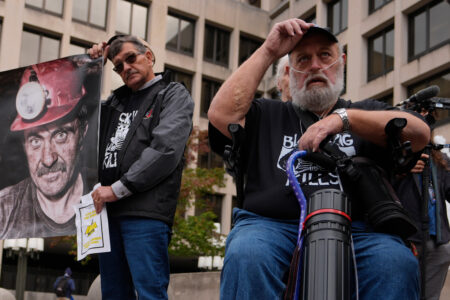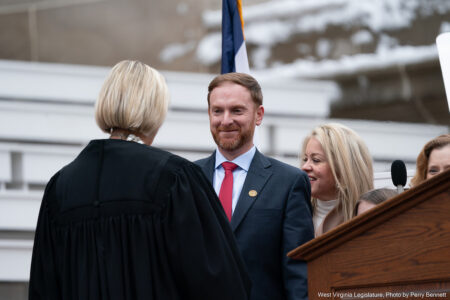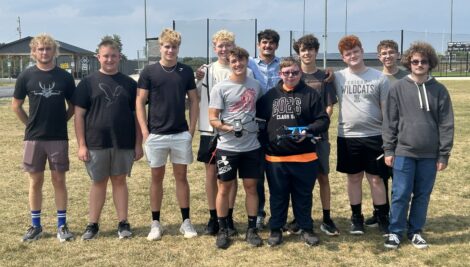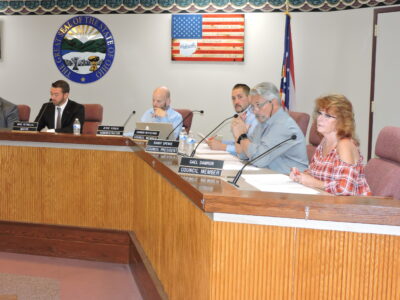Attorney General J.B. McCuskey remarks on first year in office and future plans
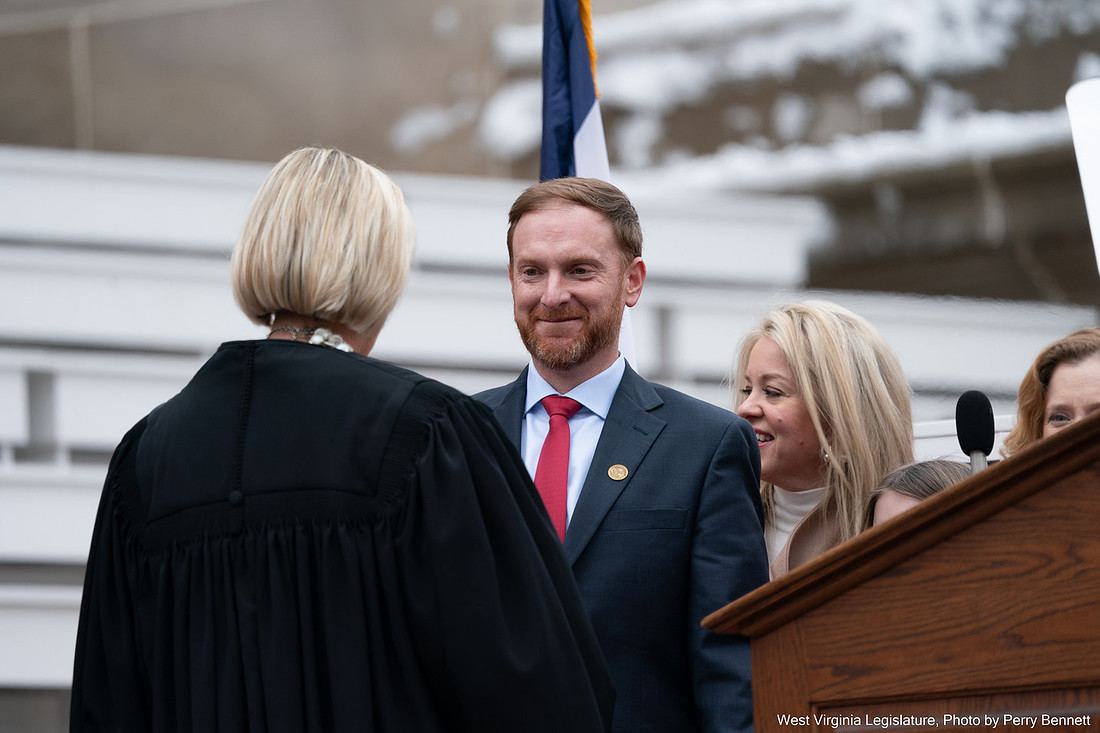
Photo Courtesy/WV Legislative Photography FIRST STEPS – Former West Virginia Supreme Court of Appeals justice Beth Walker administers the oath of office to newly elected Attorney General J.B. McCuskey on Jan. 13 at the State Capitol Building’s northside steps.
CHARLESTON – West Virginia Attorney General J.B. McCuskey is no stranger to statewide political office having spent two terms as state auditor, but he admits that leading the Mountain State’s top law firm has brought him new challenges.
“When you’re everyone’s lawyer, that was a weight that I felt very quickly…I wasn’t prepared for how impactful that would be on how I viewed my job,” McCuskey said during a sit-down interview in his offices on the opposite side of the State Capitol Building from where he spent eight years as state auditor.
“Let me say that a different way. I don’t think I knew that I was going to be able to fulfill what I feel like is the best way of being a public servant by being the attorney general,” McCuskey continued. “I’m not sure I realized the…ability that I would have using my legal abilities and being the people of West Virginia’s lawyer (and) how fulfilling that would make me feel from a professional and from a public service standpoint.”
McCuskey won election as West Virginia’s 35th attorney general last November, defeating former state senator and former U.S. Attorney Mike Stuart in the Republican primary and defeating Wheeling attorney and state Democratic Party Vice Chair Teresa Toriseva in the general election. McCuskey briefly ran in the GOP primary for governor before switching to attorney general.
After serving as a member of the House of Delegates representing Kanawha County for two two-year terms, McCuskey was elected as state auditor in 2016 and served two four-year terms. The son of former West Virginia Supreme Court of Appeals justice John McCuskey, J.B. worked in his family’s law firm and later for the American Center for Law and Justice and the Department of Defense at the Pentagon.
McCuskey succeeded three-term attorney general Patrick Morrisey, who took office as West Virginia’s 37th governor in January. Since the beginning of the year, McCuskey has been working to put his own stamp on the office, which in many ways operates as a state-owned law firm.
McCuskey brought over key staff from his time as state auditor, such as Communications Director Kallie Cart and Chief of Staff Jeff Waybright. McCuskey recruited Michael Williams as his solicitor general as well as new assistant attorneys general across the office’s 10 divisions.
“I think the first and biggest success that I had was building a team of people to work with,” McCuskey said. “I have a team of people around me that I trust, not only…as human beings, but I trust their legal work and their communications work and their management styles…I am able to be the big picture leader of the office and trust that the work that’s being done by my team is going to be done properly and in a way that I’m proud of.”
The attorney general not only represents state departments and agencies in court, but it defends state interests abroad against regulatory overreach by other states and the federal government. In West Virginia, that means defending the state’s coal and natural gas industries.
One of McCuskey’s first actions as attorney general was a multi-state lawsuit in federal court against the U.S. Environmental Protection Agency challenging EPA plans under former president Joe Biden to implement a waste emissions charge – also called the methane tax rule. Another multi-state federal lawsuit led by West Virginia is challenging New York’s Climate Change Superfund Act.
“I come at this with a lot of experience, working to promote the energy industry, to promote the employment of the energy industry, and to promote how energy is going to rebuild West Virginia’s future. And so, that was an easy sort of transition for me,” McCuskey said. “The really important part about that is that we were able to continue to be the nation’s leader on energy issues in terms of attorney generals because of the team of people that I brought in…Where there’s big energy issues in this country, West Virginia is the leading lawyer on it.”
McCuskey has also taken up the mantle of taking on some of the large corporations whose alleged actions played a role in fueling West Virginia’s substance use disorder crisis. In August, McCuskey filed a lawsuit against Evernorth Health Inc., formerly known as Express Scripts Holding Company, and other subsidiaries of the large Missouri-based pharmacy benefits management (PBM) company.
The state alleges that Express Scripts, by prioritizing profits and leveraging its market dominance, contributed to the oversupply of prescription opioids in West Virginia and the deepening of the substance use disorder epidemic in the state.
“Holding people accountable for actions that contributed to the suffering of West Virginians is one of the most important things that the Attorney General’s Office does, and Express Scripts played a key role in the opioid crisis that has gotten us to where we are today,” McCuskey said. “We are going to hold them accountable, them and some of the other pharmacy benefit managers who played a role in that as well.”
McCuskey framed the crisis as a symptom of widespread hopelessness, arguing that economic prosperity – driven by sectors like energy – is a crucial part of the long-term solution.
“We have to create an environment where noticeably and substantially less people are trying any drugs, and that comes from an environment where you have shared prosperity and where the economy is growing and where the schools are really good,” McCuskey said. “Our herculean task is, how do we raise the spirits of the average West Virginian?
“People need to feel like their job matters, like their life matters, like the things that they are doing are making, not just West Virginia, but the country stronger and better,” McCuskey continued. “And when that starts to happen, people have a very, very different perspective about what waking up tomorrow means.”
Next year, McCuskey plans to focus on efforts to hold tech and artificial intelligence (AI) companies accountable when it comes to children, such as Roblox, an online game platform that allows users to create their own games. Several state attorneys general have filed suit against the creators of Roblox, which has no age restrictions and can be used by predators to exploit children.
“Roblox doesn’t have any protections to ensure who’s on Roblox,” McCuskey said. “There are hundreds of instances where child predators go on Roblox, identify children playing it, and actually abduct them based on conversations they have within the game…If you allow the group to build these worlds and you don’t restrict the group to people that it’s supposed to be around, the consequences can be catastrophic.”
McCuskey cited the growing use of generative AI – such as OpenAI’s Chat GPT – by children whose interactions with the app can sometimes become toxic.
“In the last two or three years, there have been multiple instances of teen suicides where the AI wrote the suicide note, taught the kid how to commit suicide, and in some instances encouraged them to kill themselves,” McCuskey said. “These are things that are the core mission of our Consumer Protection Division…to use our office’s power to represent the powerless and to say to these folks you’re not going to do this to people of West Virginia.”
McCuskey said his office also plans to look into issues of food manufacturers using food additives that have effects on people’s health, and the growing issue of illegal gambling, such as sweepstakes casinos.
The Attorney General’s Office is also gearing up for a landmark case before the U.S. Supreme Court in West Virginia v. BPJ. The Supreme Court agreed to review a decision by the U.S. Fourth Circuit Court of Appeals, which blocked enforcement of House Bill 3293, relating to single-sex participation in interscholastic athletic events.
HB 3293, passed by the West Virginia Legislature in 2021, requires student-athletes in middle school, high school or college to participate in sports that match the student’s sex assigned at the time of their birth. The law applies to sports regulated by the NCAA and other college interscholastic organizations. The law is now called the Save Women’s Sports Act.
Becky Pepper-Jackson, a Harrison County high school cross country and track athlete who has identified as a girl since third grade and takes puberty-blocking medication, filed a lawsuit against HB 3293 in May 2021 shortly after the law went into effect. After a lower court allowed the law to be enforced, the Fourth Circuit overruled that decision, preventing the law from being enforced while the case was pending.
“We feel very, very good about our case. It will be our first opportunity to be in front of the United States Supreme Court,” McCuskey said. “What is decided in the BPJ case at the United States Supreme Court will be a bellwether for how we deal with fairness in women’s sports and fairness in locker rooms going forward for a very long time.”
State attorneys general, whether Democratic or Republican, are now at the forefront of leading federal litigation and are often more flexible to act than U.S. Attorneys or the U.S. Department of Justice. That also makes them more political. Since taking office, McCuskey has joined other Republican attorneys general in writing letters to Congress, President Donald Trump and his cabinet secretaries, and even lawmakers in other states urging action on various political issues.
As a result, McCuskey has found himself occasionally crosswise of some West Virginians who don’t share his same politics and who are unaccustomed to McCuskey wading into partisan political issues. But McCuskey said the very nature of being attorney general means he must argue for one side or the other.
“I don’t worry about disenfranchising people because I have great confidence that the decisions that I make are for the greatest amount of people possible,” McCuskey said. “The Attorney General’s Office requires you to be on one side or the other, and so I don’t get to live in a middle world.
“The job of a lawyer, the ethics of a lawyer, is to zealously advocate for the position of your client, and the attorney general has to make the decision frequently about who is my client in this instance,” McCuskey continued. “When you pick a side and you say, ‘I’m going to advocate for this,’ you can’t advocate it halfway. The system only works when the best lawyers are arguing with each other in the most confrontational ways, actually. That’s the whole point.”
(Adams can be contacted at sadams@newsandsentinel.com)

